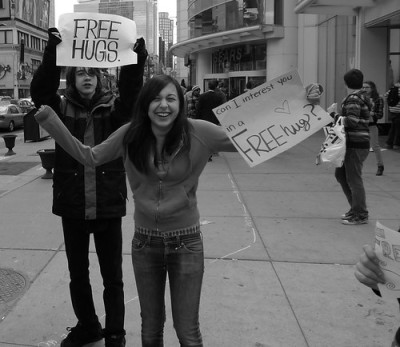Hyper-Empathy: When Caring Too Much Starts to Hurt

By: oh__calamityCan you really care too much about what someone else is going through?
Can you really care too much about what someone else is going through?
Most of us value empathy as a sign of kindness and emotional intelligence. But when empathy becomes so strong that another person’s pain feels like your own, it can start to take a toll. Psychologists sometimes refer to this as hyper-empathy – an experience of empathy that’s unusually intense, prolonged, or hard to regulate.
What Is Hyper-Empathy?
The prefix hyper- means “above average”. In neuroscience, the term has appeared in case studies such as a woman who, after surgery on the amygdala and hippocampus to treat epilepsy, developed strikingly heightened emotional responses to others’ distress.
However, hyper-empathy is not a clinical diagnosis. You won’t find it in the DSM-5 or ICD-11, and no therapist will formally diagnose you with it. Instead, it’s a way of describing an emotional style where compassion and attunement cross into overwhelm.
The Science of Empathy
Empathy has two main components:
-
Affective (emotional) empathy – feeling what another person feels.
-
Cognitive empathy – understanding what someone else might be thinking or experiencing.
Healthy empathy also involves self-other distinction and emotion regulation – the ability to know what feelings belong to you, to set limits, and to return to equilibrium after connecting with someone else’s emotions. When these boundaries blur, we move into empathic reactivity: an automatic, exhausting mirroring of others’ emotions.

By: Rastamark
Hyper-Empathy and Autism
Recent research shows empathy in autism is complex and varied, not absent.
Some autistic people describe intense emotional contagion or mirror-touch sensations – literally feeling others’ pain in their own bodies. Others experience challenges mainly with cognitive empathy (perspective-taking), while their emotional empathy remains high.
In this sense, what looks like “hyper-empathy” may reflect a different balance of empathy systems rather than a disorder. It can also help explain why anxiety, sensory overload, or social burnout can follow deep emotional resonance with others.
Signs You Might Experience Hyper-Empathy
Everyone feels deeply from time to time, but if empathy regularly leaves you drained or distressed, you might notice:
- Feeling exhausted after social interactions
- Difficulty saying no or putting your own needs first
- Staying upset for hours or days after someone else’s distress
- Physical tension or nausea when others are upset
- Over-the-top emotional reactions to news stories or films
- Letting others treat you poorly because you “feel sorry for them”
- Struggling to focus on your own life because you’re absorbed in others’ pain
These reactions signal that your emotional boundaries and regulation systems may need support.
Why It Happens
Several underlying patterns can amplify empathic reactivity:
1. Boundary challenges
If you grew up in an environment where your needs weren’t prioritised, you may never have learned to separate responsibility for your emotions from others’. Empathy then turns into emotional caretaking.
2. Codependency
Deriving self-worth from meeting others’ needs can make you over-tune to their emotions in hopes of feeling valued or secure.
3. Anxious attachment
Early experiences of inconsistent love can create a drive to earn closeness by over-understanding or over-feeling others.
4. Anxiety and hypervigilance
When the nervous system is on high alert, other people’s moods can feel like potential threats. Empathy becomes entangled with fear.
5. Low self-compassion
Paradoxically, those who show endless empathy for others often struggle to extend the same gentleness to themselves. Without self-empathy, caring becomes depleting.
6. Trauma and projection
Unprocessed pain can cause us to see our own suffering reflected everywhere, reacting strongly to injustices that echo our past wounds.
7. Emotional dysregulation (e.g. in BPD)
Some individuals experience powerful emotional surges and rapid mood shifts. This can bring bursts of empathic intensity but also misinterpretations of others’ states.

By: H.L.I.T.
Just Sensitive or Something More?
Being emotionally attuned is not a flaw. Many people identify as highly sensitive or naturally empathic and lead balanced, fulfilling lives.
The issue arises only when empathy turns to emotional fusion – when your wellbeing consistently depends on how others feel. In that case, therapy can help strengthen boundaries and self-soothing skills so empathy becomes sustainable rather than overwhelming.
How to Manage Hyper-Empathy
You don’t need to “turn off” empathy, only learn to regulate it. Try:
- Grounding and body awareness: notice where emotions sit in your body and release them through breath or movement.
- Boundary statements: practise phrases like “I care, but I can’t take this on for you.”
- Limit emotional exposure: take breaks from distressing media or draining conversations.
- Develop self-empathy: treat your feelings with the same compassion you offer others.
- Therapeutic support: a counsellor or psychotherapist can help you separate caring about someone from feeling as them.
When to Seek Help
If emotional overwhelm affects your relationships, work or physical health, professional support can make a profound difference.
Therapy can help you identify the roots of hyper-empathic patterns, develop healthy detachment and restore balance between compassion for others and compassion for yourself.





Hi,
I believe that I am suffering with hyper-empathy, hyper-sensitivity.
I have done some work lately with some psychotherapist but I would love to continue on this new aspect.
I look forward to reading from you.
Hi MD, it’s great that you are working with a psychotherapist. Have you bought this up with them? If it’s a concern to you it’s definitely worth sharing with your therapist. All the best.
Hi, I think I might have hyper empathy. I often find myself gaining symptoms of which is found in others mental health issues. For instance, I have friends with Tourettes, I often find that when I’m around them and they have tics, I also do to, without meaning to. Or I get super paranoid about everything because I know people with high paranoia.
If anyone can help me out with this it would be greatly appreciated.
Hi Ollie, yes, any therapist or counsellor should be able to work with you on this. It might, for example, be an identity issue. If you grew up in a household where you had to be pleasing to gain the love and attention, over time you learn to mould yourself to those around you and lose sight of yourself. You can either talk to your GP to get a referral under the NHS or seek private counselling, we offer counsellors for any budget on our booking site. https://harleytherapy.com/
Hello Ollie,
I don’t really know if I have any of these disorders. I know I always cry if someone else does, family friend or someone I don’t know. I cry suddenly with sad movies and cannot even watch the ending of it because of feeling so depressed and angry with myself. I have been this way for as long as I can remember and I am 79 years old at this time. I also feel nausea, headache and drained after.
Last week I flew to El Pase Texas,to help my niece, she was so hateful and after telling me she need help, she didn’t need at all. 2 days later I flew back to Cincinnati Oh. I gave up my apartment, I sold my car, I spent 1200 on plane tickets. Why do I put others before myself? That trip felt like it was killing me bodily, but I hate letting people down. Am I mentally ill? Please help.
Any research on how this might interface with ASD? I feel like that’s a part of the context for any issue I experience. But that’s obviously not an explanation on its own. It’s something that I like about myself to an extent, but it can be draining as well.
I’m a 63 year old male and a Navy veteran.I have struggled with this since I was 10 years old.
Your insight has helped me. Thank you!
Why is it that I love to watch Horror & Paranormal flicks but have to leave the room or switch the channel when it comes to death relating to a child or adolescent? I overcame a traumatic loss and since then feel overly empathic towards people and their situations to such a degree it’s not a desire I share openly with anyone.
Have been trying to work on myself and love who I am but it seems as if I still care about everyone else as well I have so much empathy for them and understanding like you would not believe I get so interested and caught up in to having conversations with people and hearing their stories and placing myself in their shoes due to the fact I’ve been through so much. I’m trying to find a balance with it all but it just alarms me the world we live in the people I’ve come encountered with my whole life has no understanding nor any empathy at all
Based on all the neuroscience studies in this area, I would like to suggest that your list of “Mental health issues” are all the RESULT of having hyper empathy, rather than the CAUSE of it.
Hyper-empathy/emotional contagion/mirror-emotion synesthesia is a common physiological brain difference in those with Autism and the mental health issues you list are coping strategies developed to deal with it.
As I’m writing this I’m crying rivers down my face but this is the first time I’m not reacting to others pain or trauma, I’m crying for myself, recognising what is wrong with me all this time, as every word rang true and hit the mark, it’s getting so hard to control now, and I need to ask for help
I’m the same kirsti just reading your post put tears in my eyes.
My daughter and son in law are having really difficult time’s and I can’t stop thinking, worrying, crying, I need help